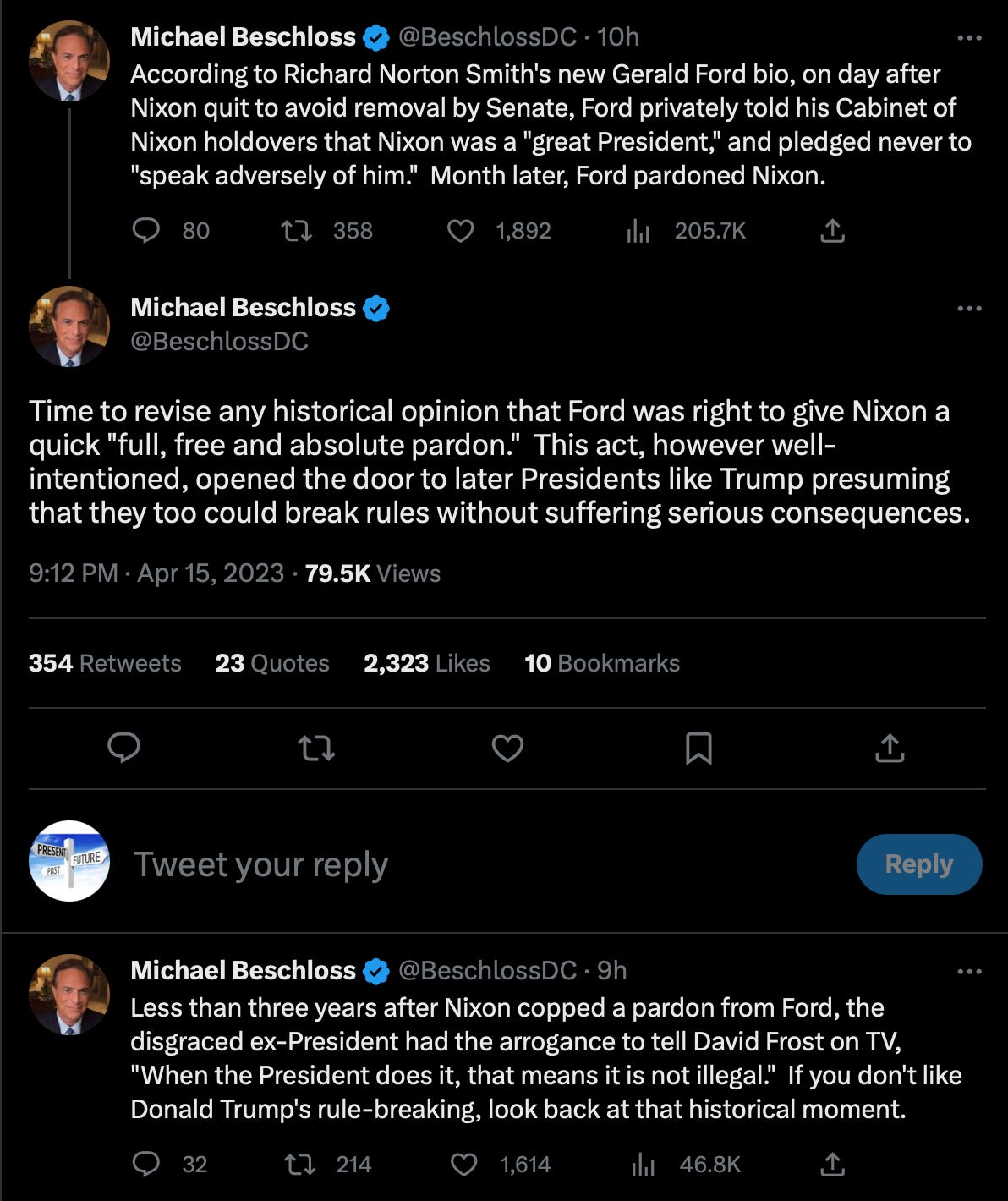On September 8, 1974, President Gerald Ford granted a full and unconditional pardon to former President Richard Nixon for any crimes he may have committed as president. The wisdom of this move has been hotly debated ever since. But what would have happened if Ford had not pardoned Nixon, and Nixon had been prosecuted for Watergate? How would history have changed?
That’s a classic counterfactual: Take the actual historical record, change something within it, and imagine how the history that followed would have unfolded.
Traditionally, historians have thought of counterfactuals as little more than entertainment for idle intellectuals because that’s how they are mostly used by historians. And writers.
Robert Harris’s Fatherland, set in the early 1960s after a Nazi victory in the Second World War, is a famous example (and a bad one as its premise — that the Holocaust was completely secret outside a small circle of Nazis — is false.) The master of this genre is Harry Turtledove, whose counterfactual stories turn on changes ranging from the bizarre (what if aliens invaded Earth in the middle of the Second World War?) to the subtle (what if the Confederate battle plan carelessly wrapped around some cigars had not fallen into the hands of Union soldiers and the South had won at Antietam?)
No one claims a Turtledove novel is serious history. But there are historians who insist that counterfactuals have an important role to play in serious history. In some circumstances, they’re indispensable.
But don’t worry. What follows isn’t a long essay about determinism and probability in defence of historical counterfactuals. That’s been done: See Niall Ferguson’s superb introduction to Virtual History, a collection of intriguing essays in which serious historians do serious historical work by engaging with counterfactuals.
I simply want to provide a short illustration of how thinking in counterfactuals can help us better understand what happened and why.
When Donald Trump was recently indicted, historian Michael Beschloss tweeted the following thread:
Beschloss is making a causal claim: By pardoning Richard Nixon, Gerald Ford led future presidents to believe they could break the law with impunity, and this explains why Trump behaved the way he did, including the hush-money payments that led to the present indictment.
Maybe that strikes you as plausible on its face. It certainly sounds reasonable to me. But is that the end of the matter? Should we conclude, as Beschloss has, that the debate over the wisdom of Ford’s pardon is now settled?
I don’t think so. A counterfactual explains why.
Imagine Ford didn’t pardon Nixon.
Tricky Dick was investigated and prosecuted for Watergate. I don’t know what punishment would have been likely under the circumstances, but let’s say Nixon was a resident of Leavenworth for several months or a year.
History rolled along. In 2016, Donald Trump ran for president and was elected.
Does this counterfactual history change Trump’s behaviour in his campaign and in office? Would Trump be more cautious and circumspect in light of the fact that a prior president had been prosecuted for wrong-doing?
With many past presidents, that question would be difficult to answer. But not with Donald Trump.
The man lied, cheated, and stole his entire life. Ethical lines are simply not part of his consciousness. Legal lines are something he has tap-danced along and beside with the aplomb of Fred Astaire. Trump’s willingness to risk civil suits, fines, and even criminal prosecution runs like a leitmotif through his whole career.
The only part of putting himself in danger of indictment by paying hush money to a porn star that is not entirely in character was that he actually paid what he promised.
Beschloss is thus asking us to believe that when Donald Trump ran for president he would have set aside his lifelong, bedrock belief that he can get away with it — whatever it is — if Gerald Ford had not pardoned Richard Nixon.
Does that strike you as plausible?
Personally, I think it’s about as likely as Donald Trump becoming a Trappist monk.
We cannot actually run this counterfactual, of course. Or any counterfactual. Which is why counterfactuals can’t deliver answers with anything approaching certainty. But they can provoke and clarify.
And on the matter of Gerald Ford’s pardon of Richard Nixon, the counterfactual strongly suggests that Donald Trump’s misbehaviour does not settle an old debate.






I agree it would not have changed Donald Trump's behaviour.
But would it have changed the behaviour of some Republicans? Would Mitt Romney and Liz Cheney have been so ostracized by the party? Would they have got the handful of extra votes they needed to convict?
I remain gobsmacked at the blind hatred of Donald Trump in Canada generally, and by the Canadian bien pensants in particular. Its as if no Canadian has ever previously encountered a brash bullshitting New Yorker, yet there are legions of them. As off-putting as Donald Trump may be to Canadian sensibilities, he is not THAT exceptional. I am not sure you can even call him a liar per se, he is more of a chronic bullshitter (there is a technical difference). And I don't think even as someone ethically challenged, he is much different from most current politicians.